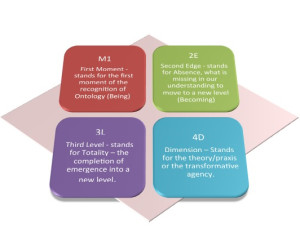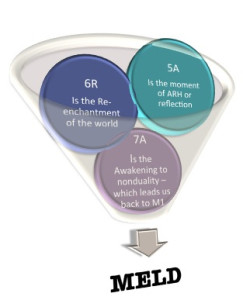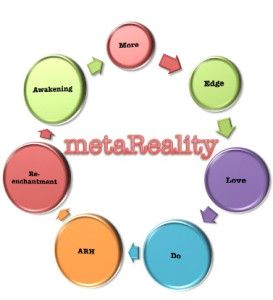The Seven Ontological Levels of Critical Realism as seen through the lens of Alethic Coaching.
Critical Realism begins by recommending that we step back from our experience and notice that there is the first (1 M)oment of non-identity, or that which exists before we have named it through our experience of it. This is a response to both Kant and Hume, Kant said there is a mind independent world but because it is independent from mind, we can never know it. Hume said that there is only our experience and how we construct that experience by a process of if A then B, or if the sun comes up today and it did yesterday then it will do tomorrow.
Both these two ways of thinking are what we might call closed systems; Kant creates fixed categories of the thing in the world and Hume has constant conjunctions of events.
 Critical Realism offers that the world is mostly open with things that we know we know about the world, and things that we do not know about the world, but still exist in the world. Gravity would be a good example, Gravity was a force at the moment of the big bang, it did not come into existence when the apple dropped on Newton’s head.
Critical Realism offers that the world is mostly open with things that we know we know about the world, and things that we do not know about the world, but still exist in the world. Gravity would be a good example, Gravity was a force at the moment of the big bang, it did not come into existence when the apple dropped on Newton’s head.
Therefore, Critical Realism attempts to offer a way that we can investigate the world as an open system, of natural necessity, and recognise that there is not a flat plain of existence but that it is stratified.
We therefore have the Real, the Actual and the Empirical domains of reality; the Real is that which exists, whether we know it to, the Actual are the casual events, and the Empirical are our experience of the events.
Within a open system, we can never really tell what might happen, this leads to the process of emergence, take for example Water – there is no way that we could predict that hydrogen and oxygen would make water. One way in which we can track the process of emergence is through retrodiction, which we can see as backwards version of prediction.
One way that we can apply retrodiction process is as a transcendental question, here transcendental means beyond, and it takes the form of – What must be the case for something to exist.
At this stage, Critical Realism is attempting to include Hegel’s Philosophy while suggesting that as the world is an open system we should not create a dialectics that makes things perfect, we need a dialectics that is robust enough to include absence or the possibility of nothing.
“the positive as a tiny, but important, ripple on the surface of a sea of negativity” Bhaskar Dialectic – The Pulse of Freedom
A Critical Realism Dialectical approach means we take more than one way of looking at something and see if we can through letting go of some aspect of each looking create a more inclusive looking, that still recognises that there are things that we do not know about the world so any new looking is a partial looking.
We therefore now (2 E)dge into the recognition that we have to both absent things from our experience and recognise that within our experience we are absent of something.
A way of putting this might be the Shadow, things we do not want in our experience we absent into the shadow, in the hope that we can forget about them but they have not been fully absented, and at times we can reconnect to the thing we have absented through projection.
Critical Realism, might suggest that we need to do is a deeper layer of absenting, we need to take that which is in the Shadow and absent the tendency, which meant that we put the thing in the Shadow in the first place.
Lets say your culture told you anger was bad and so you placed anger in the Shadow, anger is now absented. You have now lost both the positive and negative aspect of anger and because you have not built a relationship with your anger, you fear the release of anger, which means that there is no alternative, but to absent or repress anything that might allow your anger to flourish. You enter into a master slave relationship to your anger, as you keep working to keep it at bay.
In effect, you have not absented your anger at all. What you would need to do to free yourself would be to recognise how you are within a master/slave relationship to anger.
This leads to the next stage as you begin to create a new (3 L)evel of becoming. You begin to see the whole scope of Anger and its importance within your life. You see that Anger can have a transformative quality, it’s the same quality that Gandhi, Martin Luther King, Mandela, had, and as you see anger as a transformative power you create a new way of being, a new totality that is still open to the possibility of deeper change and transformation.
And as the full scope of anger opens up and you build the connection to the natural necessity to have anger as part of your life, you discover a new (4 D)imension to who you are, a greater power flows through you as you connect to your pulse of freedom, and you ask of yourself within this new dimension of self how will I act.
With the new dimension within you, as you move towards the meta Real you can bring a greater degree of (5 A)wareness to who you are and your place in the world, you can begin to reconnect to your embodied personality as it engages with the natural world, the material world, the social world and your own personality, at this point in awareness, you can…
…(6 R)e-enchant the world, allowing more space for Spirit to show up, and as you allow more space for Spirit you…
…enter into the (7 Z)one of the non-dual, in which you discover there is the 1st Moment of non-identity which we discover there is more to the world than you thought.

